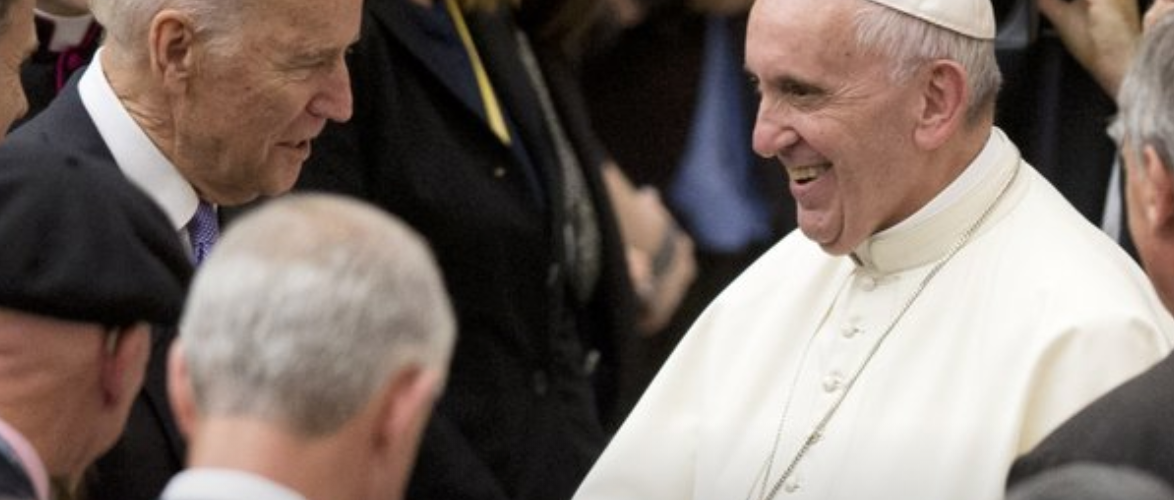New: Would Biden’s reversal on the Hyde Amendment prove a liability with voters of his faith in the general election? A deeper look at the Trump-era politics of abortion for Catholics. https://t.co/sy7QbcFWsA
— Elana Schor (@eschor) September 17, 2019
Abortion politics is — generally speaking — complicated.
I was pleased to see Elana Schor, The Associated Press’ new religion and politics reporter, take a thought-provoking dive into the subject.
Her specific angle: How former Vice President Joe Biden’s shift on the Hyde Amendment is playing among his fellow Catholics.
I have a small suggestion concerning the AP report out today and want to point out an interesting editor’s note appended to it.
But first, I just want to compliment Schor for an excellent piece of religion journalism.
The punchy lede sets the scene:
WASHINGTON (AP) — It was one of the first stress tests of Joe Biden’s presidential campaign: A sudden reversal of his decades-long support for restricting federal funding of abortions.
The move seemed sure to hurt the former vice president with Catholics, particularly those in the Midwest, whose support will be critical to winning the Democratic primary and the general election. But so far, Biden has faced little criticism over his shift on abortion funding relative to other aspects of his record, and polls show that he remains Catholic Democrats’ overwhelming favorite in the presidential field.
Since the days of John F. Kennedy, Catholic Democrats have wrestled to reconcile their church’s teachings with their party’s politics. That tension has been especially acute when it comes to abortion, with some bishops threatening to deny communion to then-Sen. John Kerry over his support for abortion rights during his 2004 presidential bid. But the church has faced significant upheaval in the 15 years since then, raising questions about whether Biden’s leftward step on abortion is a liability with some voters of faith — or a more minor hurdle at a time when Catholics, like the electorate nationwide, are becoming more politically polarized in the age of President Donald Trump.
Keep reading, and Schor mixes insightful details, helpful sources — including Steven Krueger, president of the nonprofit Catholic Democrats — and timely poll data.
I appreciated, too, that she quoted Biden in his own words concerning his personal and political beliefs on abortion:
“Just as I’ve never attempted to impose my views on anyone else as to when life begins, I have never attempted to impose my view on who should pay for it,” Biden said as he shifted from supporter to opponent of Hyde, which bars federal funds from use on abortion services except cases of rape, incest, or risk to a woman’s life.
Later, the AP reports gives him more space to elaborate:
“I’m prepared to accept for me, personally, doctrine of my church” about when life begins, Biden said, “but I’m not prepared to impose that on every other person.” He reiterated his support for codifying Roe v. Wade into federal law, if elected.
My small suggestion will sound familiar to regular GetReligion readers because it’s a point we’ve made repeatedly: The notion of a Catholic voter is, in some respects, mythical.
It helps to know, as our own Terry Mattingly puts it, whether the person is an ex-Catholic, a cultural Catholic, a Sunday-morning Catholic or a “sweats the detail” Catholic. In other words, it’s complicated (there’s that word again), and AP might consider ways to relate that in future stories.
Meanwhile, this editor’s note caught my attention:
Associated Press religion coverage receives support from the Lilly Endowment through the Religion News Foundation. The AP is solely responsible for this content.
As Godbeat observers know, AP, Religion News Service and The Conversation received a $4.9 million Lilly grant to boost religion news coverage.
Kudos to AP for its transparency in noting the source behind the funding for Schor’s new position.










